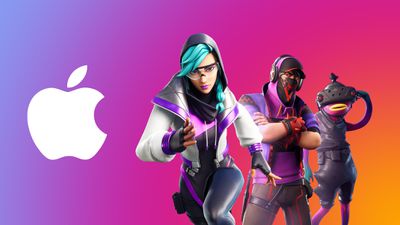Epic Games this evening sent out emails to Fortnite users on iPhone, iPad, and Mac to let them know that it will not be possible to play the newly released Marvel-themed season 4 content on their devices.

In the email, Epic Games blames Apple's App Store fees for the unavailability of new content, even though Apple has said that if the direct payment option is removed and Fortnite obeys App Store policies, it can be updated and remain in the App Store while the legal battle between the two companies plays out in court. From the Epic Games email:
Apple is blocking Fortnite updates and new installs on the App Store, and has said they will terminate our ability to develop Fortnite for Apple devices. As a result, the Chapter 2 - Season 4 update (v14.00), did not release on iOS and macOS on August 27. [...]
Apple limits competition so they can collect 30% of consumer payments made in apps like Fortnite, raising the prices you pay. Epic lowered prices through a direct payment option, but Apple is blocking Fortnite in order to prevent Epic from passing on the savings from direct payments to players. Epic has taken legal action to end Apple's anti-competitive restrictions on mobile device marketplaces. Papers are available for our August 13, August 17, and August 23 filings. In retaliation for this action, Apple blocked your access to Fortnite updates and new installs on all iOS devices.
Epic Games informs customers that they can still play the existing season 3 content, but progression is not possible and iOS and Mac players cannot play cross-platform with those on other devices. Players using Apple products cannot access the new cosmetic options, nor can they receive gifts from the new season unless they log into an alternate platform that has access to the season 4 content. Battle Lab, Duos, and LTMs are disabled on iOS, and iOS players are unable to complete new Quick Challenges and Style Challenges.
In lieu of iOS devices, Epic Games recommends customers play Fortnite on Android, PC, PlayStation, Xbox, or Nintendo Switch, and it directs customers to Apple to ask for refunds for in-app purchases.
Epic Games attempted to get a temporary restraining order that would force Apple to allow Fortnite updates to continue to be available on iOS devices and that would prevent Apple from terminating the Epic Games developer account, but the judge sided with Apple and did not grant a restraining order for Fortnite.
The judge overseeing the case told Epic Games' lawyers that all Epic needs to do "is take it back to the status quo and no one suffers any harm," but Epic has opted not to do so and is standing firm as Apple prepares to terminate its developer account. Epic lawyers in fact said that Epic "can't go back into an anticompetitive contract."
Apple said in mid-August that Epic would lose access to its developer account on August 28, which is tomorrow, so it looks like Fortnite will be unavailable for the foreseeable future as it appears neither side has plans to back down.
Apple was also going to block Epic from working on the Unreal Engine used by third-party developers, but Epic was able to successfully secure a restraining order to prevent that from happening. So while Apple is allowed to block Fortnite so long as Epic continues to violate App Store rules, it is not allowed to terminate the Epic International developer account and tools used for the Unreal Engine.
The next hearing in the Apple vs. Epic battle will take place on September 28, with Epic aiming for a preliminary injunction that will allow Fortnite back onto the App Store.
























